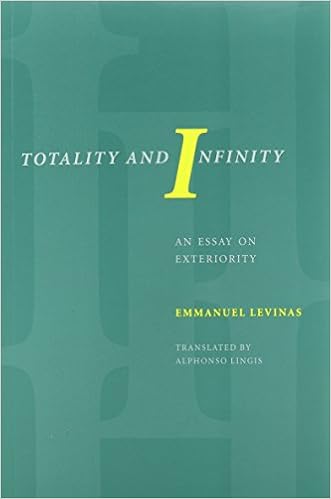
Free eBooks Totality And Infinity: An Essay On Exteriority (Philosophical Series) Available To Downloads

Influenced in part by the dialogical philosophies of Franz Rosenzweig and Martin Buber,Totality and Infinity departs from the ethically neutral tradition of ontology to analyze the "face-to-face" relation with the Other. First published in English by Duquesne in 1969, this has become one of the classics of modern philosophy. Fully indexed.

Series: Philosophical Series (Book 24)
Paperback: 314 pages
Publisher: Duquesne (December 1, 1969)
Language: English
ISBN-10: 0820702455
ISBN-13: 978-0820702452
Product Dimensions: 6 x 0.8 x 9.1 inches
Shipping Weight: 1.3 pounds (View shipping rates and policies)
Average Customer Review: 4.3 out of 5 stars See all reviews (17 customer reviews)
Best Sellers Rank: #115,980 in Books (See Top 100 in Books) #16 in Books > Politics & Social Sciences > Philosophy > Movements > Phenomenology #25 in Books > Textbooks > Humanities > Philosophy > Metaphysics #149 in Books > Textbooks > Humanities > Philosophy > Ethics

To previous reviewers:~ Levinas is trying to uncover the source of the idea of infinity ~No, infinity by definition is boundless and cannot be encompassed or reduced. Levinas is not asking the Cartesian question nor concerned with securing the `existence' of the external world. The concept of infinity is unique in that its content always exceeds or overflows its concept. Ethical relation operates in just this manner: the relation to the other is not negative (ala Idealism) but rather a relation to an excess. This excess is no Hinterwelt, but rather goodness.~ Then he proceeds to "show" that the face to face relation with the Other is the source for our capacity to have theoretical and practical knowledge. ~Indeed. Though the term `source' is very problematic. Levinas shows theoretical and practical `knowledge' - science and law/politics - are fundamentally social. In this way, the ethical relation opens and conditions this `knowledge,' while always exceeding it. What if science claimed to discover that women were `inferior' to men? We would no doubt question the `truth' of this discovery. Why? Because such a claim seems to exceed the bounds of what scientific activity can produce. This example shows how ethics exceeds theoretical knowledge. The same goes for the `practical.' Why do we think that segregation is wrong or unjust? Why is excluding the `other' from basic political participation, and the responsibility and rights it entails, a problem? Political theory and practice, which in its way is a kind of `scientific ethics,' can also lead to problematic situations. How are we able to judge or discern or resist claims that seek to justify unethical attitudes and practices?
Totality and Infinity is Levinas's first magnum opus, one of two. It is truly an amazing and magnificient piece of work. I had read later Levinas first and began reading this one initially as a sort of self-imposed mandatory prerequisite to read his second magnum opus Otherwise Than Being. Being used to later Levinas, it was an adjustment to read this earlier text. The language of both eras is highly dense and complex (and original), but the earlier language is more pedagogic and the structure more methodic.At times, I didn't think I would finish the book. I knew I loved Levinas, but in this book the phenomological analyses are so thorough and extensive, that I wondered if it was the same author at times or when I'd find the definitive Levinasian mark of ethics, of the face. However, I am very happy that I did finish this book. Virtually the first half of the book is about Separation - an ambivalence in which a being masters and enjoys but is also dependent on the resources of the world. Interiority does not commence as a cogito or reason, but as enjoyment (of the world). Every being, in their enjoyment of this life, is separated from a totality that would fully account for all of them. The vertigo of existence, of the "il y a" ("there is"), is subsided in the prolongation of labor and in the dwelling. However, the interior economy is still not in a "face to face."Only separated beings can enter into a face to face and share their resources with an Other.Finally, the last sections (beginning from section 3) of the book begin to look a lot like later Levinas, and he goes into extensive and radical analyses of the ultimate, irreducible relation of the face to face and its highly ethical situation. He ruminates on goodness, justice, language, plurality, and peace.
Totality and Infinity: An Essay on Exteriority (Philosophical Series) Levinas' 'Totality and Infinity': A Reader's Guide (Reader's Guides) Infinity Lost (The Infinity Trilogy Book 1) Infinity Reborn (The Infinity Trilogy Book 3) Infinity Rises (The Infinity Trilogy Book 2) Terrorism: A Philosophical Analysis (Philosophical Studies Series) Utilitarianism and On Liberty: Including 'Essay on Bentham' and Selections from the Writings of Jeremy Bentham and John Austin: Including "Essay on Bentham" and Selections from t Philosophical And Theoretical Perspectives For Advanced Nursing Practice (Cody, Philosophical and Theoretical Perspectives for Advances Nursing Practice) Freedom, Responsibility, and Determinism: A Philosophical Dialogue (Hackett Philosophical Dialogues) Philosophical Delusion and its Therapy: Outline of a Philosophical Revolution (Routledge Studies in Contemporary Philosophy) Truth and Progress: Philosophical Papers (Philosophical Papers (Cambridge)) (Volume 3) Objectivity, Relativism, and Truth: Philosophical Papers (Philosophical Papers (Cambridge)) (Volume 1) Mathematics, Science and Epistemology: Volume 2, Philosophical Papers (Philosophical Papers (Cambridge)) Raymond Chandler: The Detections of Totality Piece of Infinity (The Curse Series Book 3) The Fat Man and Infinity: And Other Writings Infinity and the Mind: The Science and Philosophy of the Infinite (Princeton Science Library) About Infinity, Universe and Worlds.: the philosophy of Giordano Bruno, Burned at Vatican 1600 for his belief in many worlds & denial of afterlife Ethics and Infinity: Conversations with Philippe Nemo One Two Three . . . Infinity: Facts and Speculations of Science (Dover Books on Mathematics)



